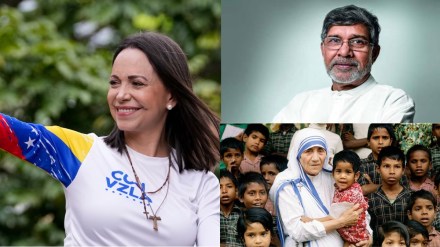Nobel Peace Prize 2025: The Nobel Peace Prize 2025 has been awarded to Venezuelan opposition leader Maria Corina Machado. This news is a blow to US President Donald Trump, who had been promoting his role in ending seven wars and was supported for the Nobel Peace Prize by Israeli Prime Minister Benjamin Netanyahu and Russia. The Nobel Peace Prize winner was announced at 2:30 pm IST in Oslo, Norway on Friday, October 10.
This year, the Norwegian Nobel Committee received a total of 338 nominations, including 244 individuals and 94 organisations, all competing for one of the world’s most prestigious awards.
Past winners of Nobel Peace Prize
As of 2024, the Peace Prize has been awarded 105 times to 142 laureates, including 111 individuals and 31 organizations. 92 men and 19 women have won individually. Malala Yousafzai is the youngest winner at 17 (2014), and Joseph Rotblat is the oldest at 86 for his work against nuclear weapons.
The International Committee of the Red Cross has won three times, and the UNHCR has won twice.
Europe leads with 45% of winners, followed by North America (20%), Asia (16%), Africa (9%) and South America (3%). UN organisations make up about 7% of all laureates.
Nelson Mandela, along with F.W. de Klerk was awarded the 1993 Nobel Peace Prize for their efforts in peacefully ending apartheid and helping establish the foundation for a democratic South Africa.
Indian who won Nobel Peace Prize
Indians including Mother Teresa, Kailash Satyarthi, and the 14th Dalai Lama, who lives in India have won the Nobel Peace Prize. Mother Teresa received the Nobel Peace Prize in 1979 for her humanitarian work. She dedicated her life to helping the poor, sick, and dying through her organization, Missionaries of Charity.
Kailash Satyarthi won the prize in 2014 for his work against child labor and for promoting children’s right to education.
The 14th Dalai Lama was awarded the Nobel Peace Prize in 1989 for his commitment to non-violence and his efforts to secure freedom for the Tibetan people while living in India.
Although Mahatma Gandhi’s principles of non-violence have inspired the world and he was nominated multiple times, he never received the Nobel Peace Prize. It’s worth noting that India’s first Nobel laureate was Rabindranath Tagore, but he won the Nobel Prize in Literature, not Peace. His writings, however, promoted unity and harmony.
Years when the prize was not awarded
The Peace Prize was not given 19 times, often due to war or lack of a suitable candidate. Years skipped include 1914–1916, 1918, 1923, 1924, 1928, 1932, 1939–1943, 1948, 1955–1956, 1966–1967 and 1972.
According to the Nobel Foundation, if no candidate’s work is considered significant enough, the prize can be withheld and the money carried forward. A famous example is 1948, the year Mahatma Gandhi was assassinated. Gandhi had been nominated multiple times, but the prize was not awarded that year, widely seen as a tribute to him.
Refusals and controversies over Nobel prize
The Nobel Peace Prize has only been refused once. In 1973, Vietnamese politician Le Duc Tho declined the award, which he shared with US Secretary of State Henry Kissinger for efforts to end the Vietnam War. Tho refused, citing that the conflict was still ongoing, according to a report by Al Jazeera.
Full list of Nobel Peace Prize past winners from 2005-2024
| # | Year | Laureate(s) | Country/Countries |
|---|---|---|---|
| 1 | 2024 | Nihon Hidankyo | Japan |
| 2 | 2023 | Narges Mohammadi | Iran |
| 3 | 2022 | Ales Bialiatski; Memorial; Centre for Civil Liberties | Belarus; Russia; Ukraine |
| 4 | 2021 | Maria Ressa; Dmitry Muratov | Philippines; Russia |
| 5 | 2020 | World Food Programme | United Nations |
| 6 | 2019 | Abiy Ahmed | Ethiopia |
| 7 | 2018 | Denis Mukwege; Nadia Murad | DR Congo; Iraq |
| 8 | 2017 | International Campaign to Abolish Nuclear Weapons | Switzerland |
| 9 | 2016 | Juan Manuel Santos | Colombia |
| 10 | 2015 | Tunisian National Dialogue Quartet | Tunisia |
| 11 | 2014 | Kailash Satyarthi; Malala Yousafzai | India; Pakistan |
| 12 | 2013 | Organisation for the Prohibition of Chemical Weapons | Netherlands |
| 13 | 2012 | European Union | European Union |
| 14 | 2011 | Ellen Johnson Sirleaf; Leymah Gbowee; Tawakkol Karman | Liberia; Yemen |
| 15 | 2010 | Liu Xiaobo | China |
| 16 | 2009 | Barack Obama | United States |
| 17 | 2008 | Martti Ahtisaari | Finland |
| 18 | 2007 | IPCC; Al Gore | United Nations; United States |
| 19 | 2006 | Muhammad Yunus; Grameen Bank | Bangladesh |
| 20 | 2005 | International Atomic Energy Agency; Mohamed ElBaradei | United Nations; Egypt |
A quick history of the Nobel Prize
The Nobel Prizes are named after Alfred Nobel (1833–1896), a Swedish chemist, engineer, and industrialist best known for inventing dynamite. While his invention revolutionised construction and mining, it also caused many deaths in wars.
The first Nobel Prizes were awarded in 1901 for achievements in physics, chemistry, medicine, literature, and peace. In 1968, Sweden’s central bank added the Prize in Economic Sciences in Memory of Alfred Nobel, bringing the total categories to six.
This year, four Nobel Prizes have been announced and the final prize for economics will be revealed on October 13.
